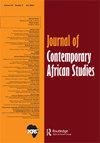Assembling UN Peacekeeping and Counterterrorism in Ghana
IF 0.8
Q2 AREA STUDIES
引用次数: 5
Abstract
Through the case of Ghana, this article proposes a link between international peacekeeping deployments and national processes of stabilisation. Based on fieldwork among soldiers and police officers, it explores how peacekeeping experiences are transferred and translated into security provision at home within the field of counterterrorism. Introducing the notion of the ‘peacekeeping-counterterrorism assemblage’ as an analytical lens for unpacking the co-production of external and internal security provision and, more specifically, the processes and practices through which international peacekeeping experiences become entangled with national counterterror policing, the article empirically unfolds the relational and societal impact of peacekeeping on domestic security. The exposure to the human consequences of warfare in peacekeeping missions, the article shows, has nurtured a profound awareness of keeping war at a distance, which may have a preventive effect on the policing of the threat of terrorism, as well as on the broader dynamics of domestic security and stability in Ghana在加纳组建联合国维和部队和反恐部队
通过加纳的案例,本文提出了国际维和部署与国家稳定进程之间的联系。基于对士兵和警察的实地调查,它探讨了如何在反恐领域内将维和经验转移并转化为国内安全保障。本文引入了“维和-反恐组合”的概念,将其作为一个分析视角,以揭示外部和内部安全保障的共同生产,更具体地说,是国际维和经验与国家反恐警务交织在一起的过程和实践。本文从经验上揭示了维和对国内安全的关系和社会影响。文章指出,在维持和平任务中接触到战争的人类后果,培养了一种与战争保持距离的深刻意识,这可能对恐怖主义威胁的警务工作以及对加纳国内安全和稳定的更广泛动态产生预防作用
本文章由计算机程序翻译,如有差异,请以英文原文为准。
求助全文
约1分钟内获得全文
求助全文
来源期刊

Journal of Contemporary African Studies
AREA STUDIES-
CiteScore
2.20
自引率
0.00%
发文量
18
期刊介绍:
Journal of Contemporary African Studies (JCAS) is an interdisciplinary journal seeking to promote an African-centred scholarly understanding of societies on the continent and their location within the global political economy. Its scope extends across a wide range of social science and humanities disciplines with topics covered including, but not limited to, culture, development, education, environmental questions, gender, government, labour, land, leadership, political economy politics, social movements, sociology of knowledge and welfare. JCAS welcomes contributions reviewing general trends in the academic literature with a specific focus on debates and developments in Africa as part of a broader aim of contributing towards the development of viable communities of African scholarship. The journal publishes original research articles, book reviews, notes from the field, debates, research reports and occasional review essays. It also publishes special issues and welcomes proposals for new topics. JCAS is published four times a year, in January, April, July and October.
 求助内容:
求助内容: 应助结果提醒方式:
应助结果提醒方式:


